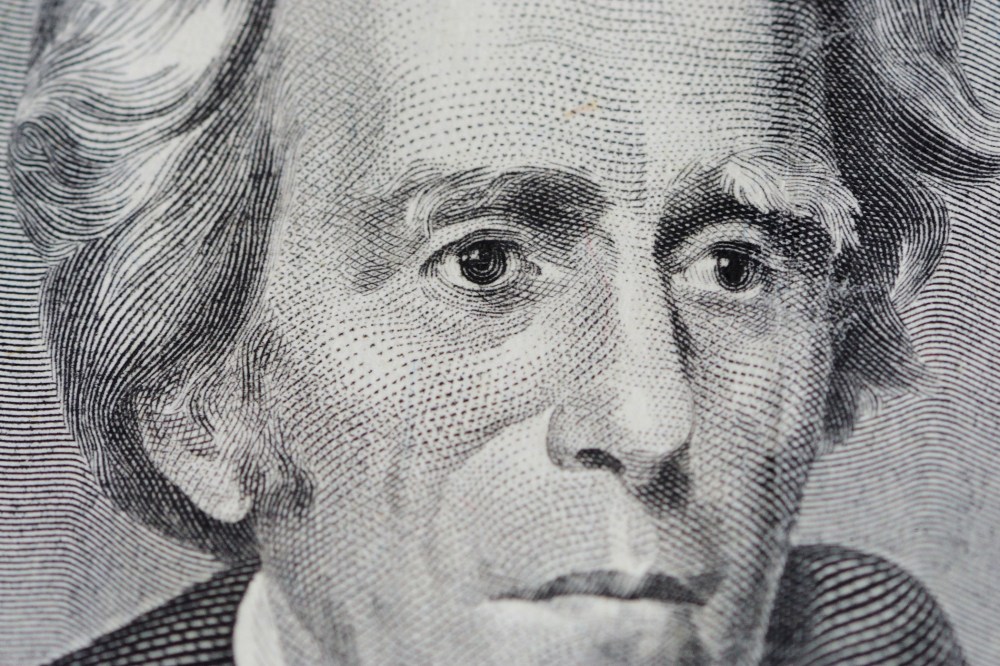I hate using ATMs. It’s not the lines that bother me, nor is it the inevitable awkwardness of the person lurking behind you, seemingly in a rush and looking over your shoulder as you type. No, I hate ATMs because I know when I swipe my card, when the machine dispenses pieces of my livelihood, I have to see that face. His face. On the $20 bill.
When historian David Greenberg thinks of Andrew Jackson, he thinks of democracy. When I see Andrew Jackson, I think of my grandmother’s spit.
* * *
The trip was long. And for an eleven-year-old, somewhat painful. Wedged in the backseat between my younger sisters and their respective mountains of Barbies, the eight hour drive felt like an insufferable eternity.
Girls, my father’s voice would boom every time our incessant complaining crossed his fatherly-defined threshold: Quiet. We are going to visit the grave of a president.
When we finally arrived, I jumped out of our minivan and began exploring. But when I caught a glimpse of my grandma, my legs came to a standstill.
I watched as my grandma walked straight to the president’s grave. She stood for half a second, then her neck arched back, her body heaved forward, and for the first time in my life, I saw my grandma spit. It wasn’t a casual spit. It was a once in a lifetime spit. I watched as the saliva of our ancestors flowed through her mouth and hit that grave with an echo that turned heads and stopped conversations.
She turned and walked straight back to the minivan. Let’s go. And so we left.
What made my grandma, who had never so much as uttered a swear word in her life, spit on the grave of Andrew Jackson? When I asked my father, his voice floundered and his eyes begged my silence. So when we got home, I asked Grandma.
Back in the comfort of her own home, her face glowed with pride as she pointed to the photos of two men that decorated the wall of her living room. These two men, Major Ridge (Ka-Nun-Tla-Cla-Geh, he who walks along the Ridge) and his son, John Ridge (Skah-tle-loh-skee, Yellow Bird), were my great-grandfathers. They fought to save an entire Nation not with a gun in a battlefield, but with a petition in a court of law.
%22With%20the%20turn%20of%20his%20hand%2C%20Andrew%20Jackson%20became%20the%20only%20president%20in%20the%20history%20of%20the%20United%20States%20to%20openly%20defy%20an%20order%20from%20the%20Supreme%20Court.%22′
In 1832, when the State of Georgia and the executive branch of the federal government threatened the Cherokee Nation’s very existence, my grandfathers—along with Principal Chief John Ross—took the Cherokee Nation’s case to the Supreme Court of the United States. In an unprecedented decision (Worcester v. Georgia), Justice Marshall issued a ruling declaring the Cherokee Nation to be a sovereign, “distinct community, occupying its own territory” with “the preexisting power of the Nation to govern itself.”
Following this victory, my grandfather John Ridge visited President Jackson in the White House. My grandfather asked how the federal government would enforce the Supreme Court’s decision. Andrew Jackson told him:
“John Marshall has issued his decision. Let him enforce it.”
And with the turn of his hand, Andrew Jackson became the only president in the history of the United States to openly defy an order from the Supreme Court.
Recognizing that neither the federal government nor the State of Georgia would abide our constitutional and inherent right to exist in our homes, my grandfathers signed the Treaty of New Echota, agreeing to relinquish our cherished homeland in exchange for land in what is now Oklahoma. Following the signing of the treaty, President Jackson forcibly placed 16,000 Cherokee in concentration camps for holding until they were “sent” to what is today Oklahoma. More than 4,000 died on the journey now known as The Trail of Tears.
Not long after they arrived in the Indian Territory, my grandfathers (both Major Ridge and John Ridge) were brutally assassinated by their fellow Cherokee. For signing the Treaty of New Echota and acquiescing to the removal, they were considered traitors.
* * *
Greenberg, writing for Politico Magazine last week, claims Jackson is “the president who made American democracy democratic.” As a lawyer who has studied the United States Constitution extensively, I find nothing democratic in a president who oversteps the constitutional bounds of his authority and defies another co-equal branch of government. Imagine if Dwight Eisenhower told the nine black students seeking to attend Little Rock Central High School in 1957: “Earl Warren made his decision, let him enforce it.” I doubt we would praise such presidential defiance of Brown v. Board of Education as “democratic.”
%22Jackson%E2%80%99s%20work%20to%20increase%20the%20political%20power%20and%20wealth%20of%20lower-class%20white%20men%20at%20the%20expense%20of%20people%20of%20color%20and%20women%20is%20not%20worthy%20of%20celebration%20or%20reverence%20in%20a%20post-Fourteenth%20Amendment%20America.%22′
Jackson not only defied the Supreme Court — he also violated the plain text of congressional statutes that he himself signed into law. In 1830, Jackson signed the Indian Removal Act, the plain language of which required a removal treaty with an Indian Nation before its citizens could be moved. However, as Suzan Shown Harjo points out in her article, “Andrew Jackson is Not as Bad as You Think, He’s Far Far Bloodier,” Jackson never negotiated or signed a removal treaty with the Muscogee Creek Nations; instead there “was no removal treaty and removal was carried out at bayonet point. … Tens of millions of acres were taken illegally, and the Muscogee Peoples still grieve over the displacement, ill treatment, and injustice, and for the homelands and ancestors left behind.”











